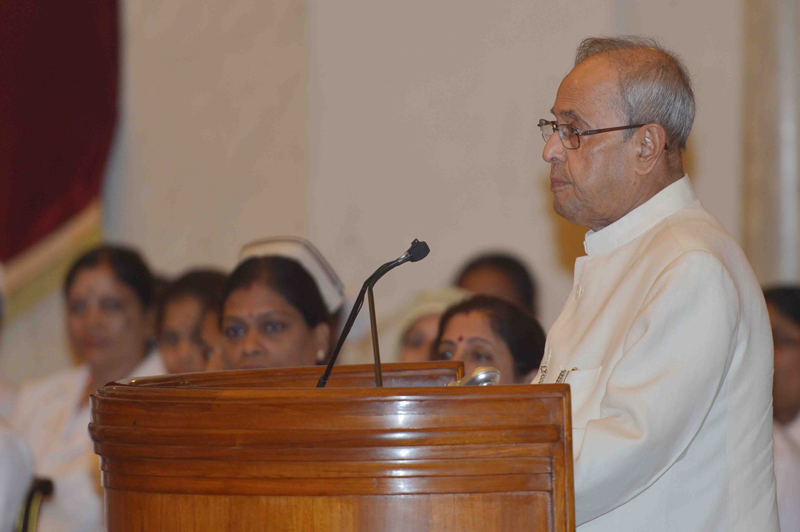
1.It is indeed a happy occasion for me to confer the National Florence Nightingale Awards for the year 2016 to the deserving nursing personnel of our country. These Awards are presented on the occasion of the International Nurses’ Day. At the outset, let me extend my warm greetings to the entire nursing fraternity on this occasion.
2.Today through the medium of these Awards, we have recognized 35 men and women who have distinguished themselves by their extraordinary services in the field of nursing. The National Florence Nightingale Awards is a fitting tribute to the iconic ‘Lady with the Lamp’ who continues to symbolize the dedication of nurses and inspire the nursing community worldwide. Florence Nightingale viewed nursing as an independent profession, which shares a unique relationship with the medical profession. Nursing professionals are the backbone of the healthcare system. Through education and innovation, this profession has undergone considerable professionalization over the last few decades.
Ladies and Gentlemen:
3.Nurses play a vital role in all aspects of healthcare, be it national health campaigns like polio eradication, mid-wife services and community education. Their level of commitment and care are much valued in both urban and rural areas, including remote areas of the country. Their contribution is critical in the achievement of the nation’s healthcare goals. Their inputs into health sector policies are equally important for they help in creating the necessary supportive work environment for their practice.
4.It is heartening to learn that theInternational Council of Nurses has selected an appropriate theme for this year:"Nurses: A Force for Change: Improving health systems’ resilience”.Developing resilient health systems is a key to realize the United Nation’s Millennium Developmental Goals. Emerging global threats such as microbial resistance, new pandemics, infections, and natural disasters have added to the pressure and demands on healthcare services. The services of nurses are crucial for a response system that a government creates to meet these challenges.
5.As the nursing profession gains a higher profile in the development of local, national and international responses, it will generate a confident and well-informed leadership. Such a leadership will pursue the interests of the nursing workforce and organize them to meet the evolving nature of the professional demands with efficacy. They will also have an important role in advancing inter-professional collaboration and ensuring that it is supported by appropriate governance and policies.
Ladies and Gentlemen:
6.The nursing personnel in our country are increasingly better educated and well-trained. They are now more adept at communicating with patients, and connecting with citizens, communities and policy makers. In the next fifteen years or so, the nature of their services will undergo significant change. Training and capacity building in this field will require new levels of innovation and leadership. Yet, one thing will endure. And that is, the premium all communities in the world will place on the sensitivity, empathy and humanity of Indian nurses.
7.Throughout the twentieth century and into the twenty-first century, significant gains have been made in increasing life expectancy and reducing many of the risk factors associated with child and maternal mortality. Nurses have made important contributions to the improvement rate of child survival. Their role and impact are well documented. But there are distances to cover in this healthcare journey. In this context, I would like to bring to your kind attention a report of the World Health Organisation and the World Bank Group. The report brings out a few alarming facts. For one, 400 million people worldwide do not have access to essential health services. And then, six percent of people in low and middle income group countries are forced into extreme poverty burdened by their expenditure on personal health. These grim findings are indicative of the fact that improvements in health and economic conditions are mutually reinforcing. We must, therefore, continue investing in improvements in the health sector. One of the key components will be adequate and wider dispersal of trained human resources.
Ladies and Gentlemen:
8.The Government of India has developed global standards for professional nursing and mid-wifery education. These are aimed at raising the quality of nursing education and creating paths for professional advancement in line with national, regional and global health needs. New technologies are now available for monitoring progress in all aspects of training and capacity building. I am confident that these new measures will go a long way in achieving the desired results.
9.With these words, I conclude. I wish the meritorious nursing professionals of our country, who have been honoured today, all success in their careers. Let me also express my deep appreciation for the efforts of the Health Minister and his Ministry for their encouragement to the nursing community through awards and similar programmes and initiatives. Best of luck for the future!
Thank you.
Jai Hind.
